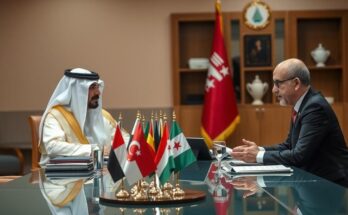Hezbollah leader Hassan Nasrallah was killed in an Israeli airstrike in Beirut, prompting widespread reactions across the Middle East. The attack also resulted in the death of an Iranian general, and elicited responses from Iran, Hamas, and regional leaders, indicating heightened tensions. Both the U.S. administration and other nations expressed support for Israel, while Hezbollah retaliated with rocket fire into Israel. National mourning was declared in several countries, illustrating the far-reaching implications of Nasrallah’s death on Middle Eastern geopolitics.
In a significant escalation in the ongoing regional conflict, Hezbollah leader Hassan Nasrallah was killed on Friday during an Israeli airstrike in the southern suburbs of Beirut. The Israeli military’s operation, termed ‘New Order’, involved dropping approximately 80 bombs, specifically targeting Nasrallah’s headquarters during a meeting with other senior officials, resulting in at least 11 fatalities and over 100 injuries, as reported by the Lebanese Health Ministry. Notably, Abbas Nilforoushan, the deputy commander of Iran’s Islamic Revolutionary Guard Corps, was also among the casualties. In response to Nasrallah’s death, Hezbollah issued a statement mourning him as a “brave martyr” while acknowledging his impactful leadership spanning nearly three decades. Israeli Defense Minister Yoav Gallant proclaimed the operation as a critical countermeasure against a significant threat, emphasizing its importance in Israel’s military history. Iran’s Supreme Leader Ayatollah Ali Khamenei condemned the assassination, calling for unity among Muslims and reaffirming Hezbollah’s role as an essential proxy for Iran in the region. Organizations such as Hamas and Yemen’s Houthis also expressed their condolences, characterizing Nasrallah’s death as indicative of Israel’s brutality. In Lebanon, the caretaker Prime Minister Najib Mikati announced a three-day mourning period, highlighting the imminent dangers facing the nation. Former President Michel Aoun lamented the loss of a leader committed to the resistance against Israel. Furthermore, Turkish President Recep Tayyip Erdogan condemned Israel’s actions, while Iraq and Syria declared national periods of mourning. Conversely, celebrations emerged in some Syrian rebel-held areas, reflecting the complex regional dynamics tied to Nasrallah’s leadership and Hezbollah’s influence. President Joe Biden, while stating a lack of prior knowledge regarding the strike, justified it as a response to Nasrallah’s previous actions against American and Israeli civilians. Similarly, Vice President Kamala Harris acknowledged the incident as a measure of justice for Hezbollah’s victims. In retaliation, Hezbollah reportedly launched approximately 90 rockets into northern Israel following the airstrike. This incident marks a pivotal moment in the sustained Israeli military offensive that has led to substantial casualties, exceeding 700 individuals in Lebanon.
The events surrounding the death of Hezbollah leader Hassan Nasrallah are situated within a broader context of escalating tensions in the Middle East. Hezbollah, a militant group based in Lebanon, has long been an influential proxy for Iran, engaging in various regional conflicts. The Israeli military’s decision to target Nasrallah signifies a strategic attempt to dismantle Hezbollah’s command structure amid ongoing hostilities. This period of unrest is characterized by reciprocal violence, with various groups and nations reacting dramatically to shifts in leadership and military strategy. The ramifications of Nasrallah’s death could have profound implications for the dynamics of power in the region, as allies and adversaries adjust their responses accordingly.
The assassination of Hassan Nasrallah by an Israeli airstrike represents a critical turning point in the ongoing conflict between Hezbollah and Israeli forces, inciting a wave of reactions across the Middle East. This event has not only deepened the existing rifts among various factions but has also provoked strong responses from regional powers like Iran and reactions from groups affiliated with Hezbollah. As the situation continues to unfold, further hostilities and significant consequences are anticipated as allies and adversaries navigate this latest development in the conflict. It remains to be seen how this event will shape the future actions and strategies of the involved parties.
Original Source: www.al-monitor.com




